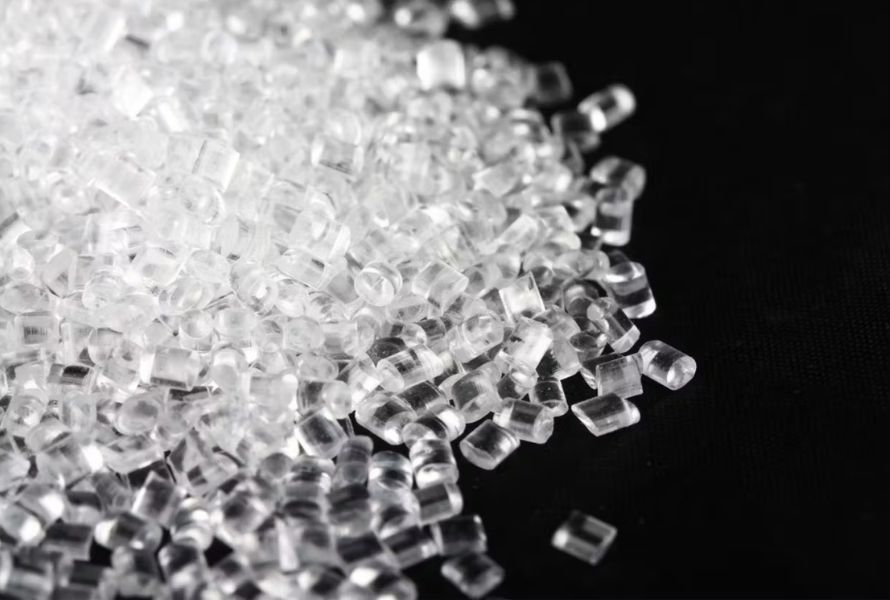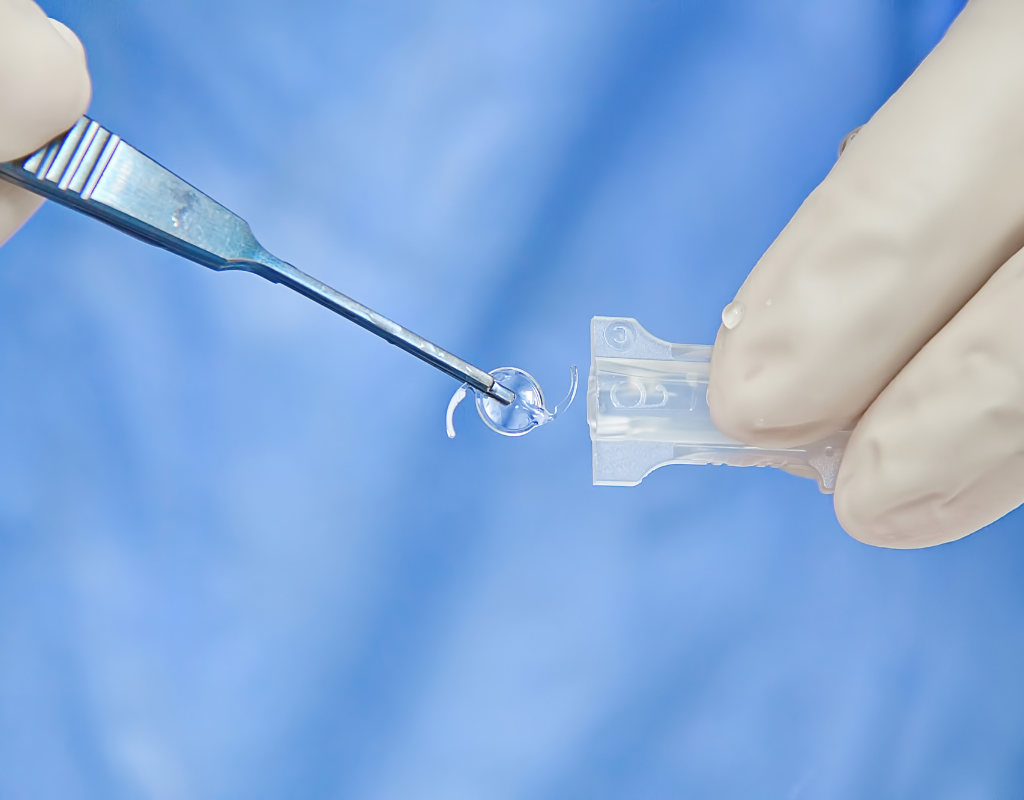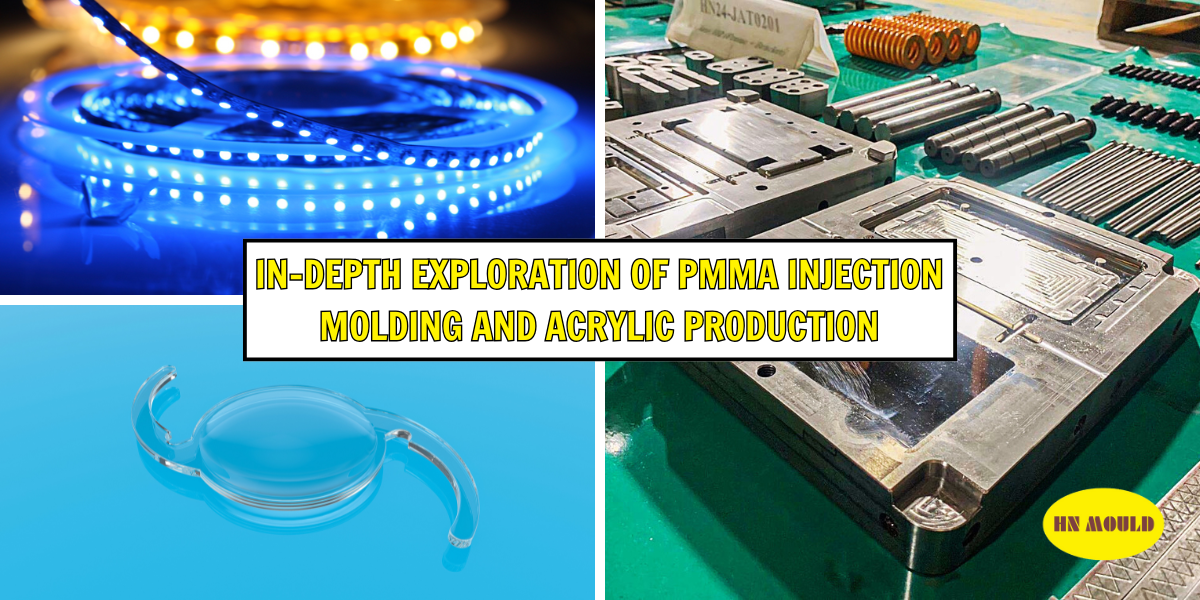Contents
PMMA (Polymethyl Methacrylate) is a transparent, lightweight, and durable plastic commonly used as a substitute for glass. With excellent light transmission and high durability, PMMA is an ideal material for various everyday applications. Due to its optical clarity, impact resistance, and ease of processing, PMMA is widely used across different industries. PMMA injection molding is an efficient manufacturing process that produces high-quality acrylic products with absolute precision.
If you are interested in injection molds and need to produce plastic products in bulk, don’t hesitate to contact Hanoi Mould or call our hotline at 0912 308 979 for a consultation!
Properties of PMMA
PMMA possesses several outstanding properties, including:
- High transparency: PMMA can transmit up to 92% of light, nearly equivalent to glass. Its high optical clarity makes it suitable for lenses, screens, and other lighting applications.
- Chemical resistance: PMMA is resistant to many chemicals and environmental factors.
- Thermal properties: PMMA’s glass transition temperature is around 105 °C, making it suitable for high-temperature injection applications.
- Mechanical strength: Although it is not as impact-resistant as Polycarbonate, PMMA has high durability, is not easily broken, and has good impact resistance.
- Ease of processing: PMMA can be easily processed using technologies such as injection molding, cutting, and welding, allowing manufacturers to create complex shapes and intricate details.
PMMA injection molding process

The PMMA injection molding process consists of several main steps:
- Material preparation: Before injection molding, PMMA must be dried. Excess moisture can lead to surface defects such as bubbles or streaks on the finished product. PMMA is dried at a temperature of about 80-90 °C for 2-4 hours, after which the resin is loaded into the injection molding machine.
- Machine setup: PMMA requires specialized equipment, with injection molding machines that can accurately control temperature and have a robust screw design. PMMA is processed at barrel temperatures ranging from 200 °C to 250 °C, with mold temperatures between 40 °C and 80 °C.
- Melting: The material is heated to its melting point to become liquid.
- Injecting the resin: PMMA requires high injection pressure, typically between 70-150 MPa, to ensure smooth flow and complete filling of the mold cavity.
- Molding: The molten resin is injected into the mold under high pressure.
- Cooling and shaping: After the resin fills the mold, the cooling process occurs to maintain the product’s shape. PMMA has a high shrinkage rate (0.4-0.7%), so proper cooling is essential to avoid warping. Depending on the thickness of the product, this process can take several minutes. Proper cooling prevents distortion and ensures dimensional accuracy.
- Product removal: Once the resin has cooled and solidified, the product is removed from the mold. PMMA can be brittle at low thicknesses, so care must be taken during removal to avoid cracking or breaking.
Learn more about the plastic injection mold manufacturing process HERE!
Benefits of PMMA injection molding
PMMA injection molding offers numerous benefits, including:
- Mass production: This process allows for the rapid production of large quantities of products.
- High precision: The products created have consistent sizes and shapes.
- Waste minimization: Injection molding optimizes material use, minimizing waste in production. Lightweight PMMA can reduce shipping costs in the supply chain.
- Flexibility: A variety of different products can be manufactured from PMMA.
- High weather resistance: Its ability to withstand UV radiation and environmental factors makes PMMA ideal for outdoor applications.
Considerations in PMMA Injection Molding
To ensure a smooth PMMA injection molding process, consider the following:
- Temperature control: Ensure accurate melting temperatures to prevent material degradation.
- Brittleness: PMMA is more brittle than other thermoplastics, making it prone to cracking or breaking under stress. Therefore, manufacturers must utilize controlled ejection techniques and avoid sharp corners in design.
- Choosing the right mold: The mold design must be precise to ensure product quality.
- High shrinkage rates: The shrinkage rate can lead to dimensional inaccuracies. Manufacturers must account for shrinkage to maintain desired tolerances, especially for precision parts.
- Material quality check: The materials must meet quality standards and be free from impurities to avoid affecting the final product.
Applications of PMMA injection molding in life

PMMA injection molding is widely used in various fields, such as:
- Construction: Used for windows, partitions, and interior decorations.
- Electronics: Used for housings of electronic devices, and lighting fixtures. Its optical clarity and scratch resistance make it suitable for devices with screen requirements such as tablets, TVs, and smartphones.
- Medical: Used for manufacturing medical components and surgical instruments. Due to its transparency and elasticity, PMMA is also used in prosthetics and intraocular lenses.
- Signage and advertising: Used to create illuminated signs and large transparent display panels.
Innovations in PMMA injection molding technology
PMMA injection molding technology continues to evolve with improvements such as:
- Process automation: Enhances efficiency and reduces production errors.
- AI utilization: Application of artificial intelligence in optimizing production processes and quality monitoring.
- Development of new materials: Research new types of PMMA with superior properties.
If you are interested in injection molds and need to produce plastic products in bulk, don’t hesitate to contact Hanoi Mould or call our hotline at 0912 308 979 for a consultation!
Conclusion
PMMA injection molding is a crucial manufacturing process in the plastic processing industry, offering many significant advantages. With its superior properties and wide applications, PMMA is increasingly becoming a top choice for various products. Although there are considerations regarding its brittleness, proper preparation, machine setup, and cooling techniques can mitigate these issues. With advancements in injection molding technology, PMMA will continue to play an important role in industries requiring functional quality and aesthetic appeal.
 Tiếng Việt
Tiếng Việt English
English 日本語
日本語
